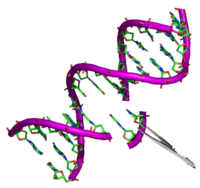
Photo from wikipedia
Six local isolates of yeasts were screened for cell mass and lipid production in mixed glucose and xylose medium. Candida tropicalis SY005 and Trichosporon (Apiotrichum) loubieri SY006 showed significant lipid… Click to show full abstract
Six local isolates of yeasts were screened for cell mass and lipid production in mixed glucose and xylose medium. Candida tropicalis SY005 and Trichosporon (Apiotrichum) loubieri SY006 showed significant lipid accumulation of 24.6% and 32% (dry cell weight), respectively when grown in medium containing equal mass of both the sugars. SY005 produced relatively higher cell mass of 9.66 gL−1 due to higher rate of sugar consumption, which raised the lipid productivity of the organism to 0.792 gL−1day−1 as compared to 0.446 gL−1day−1 in SY006. When grown with each sugar separately, the xylose consumption rate of SY005 was found to be 0.55 gL−1 h−1 after 4 days as compared to 0.52 gL−1 h−1 for SY006. Transcript expression of the high affinity xylose transporter (Cthaxt), xylose reductase (Ctxyl1), and xylitol dehydrogenase (Ctxyl2) of SY005 was monitored to unravel such high rate of sugar consumption. Expression of all the three genes was observed to vary in mixed sugars with Cthaxt exhibiting the highest expression in presence of only xylose. Expression levels of both Ctxyl1 and Ctxyl2, involved in xylose catabolism, were maximum during 24–48 h of growth, indicating that xylose utilization started in the presence of glucose, which was depleted in the medium after 96 h. Together, the present study documents that C. tropicalis SY005 consumes xylose concomitant to glucose during early period of growth, and it is a promising yeast strain for viable production of storage lipid or other high-value oleochemicals utilizing lignocellulose hydrolysate.
Journal Title: Applied Microbiology and Biotechnology
Year Published: 2020
Link to full text (if available)
Share on Social Media: Sign Up to like & get
recommendations!